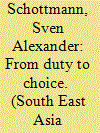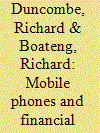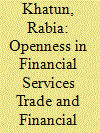|
|
|
Sort Order |
|
|
|
Items / Page
|
|
|
|
|
|
|
| Srl | Item |
| 1 |
ID:
162580


|
|
|
|
|
| Summary/Abstract |
This paper examines the state of the art of the Brexit negotiations in the area of financial services. It uses a two‐level game model to first explain the positions of UK and EU negotiators on the basis of the domestic constraints they face, and second, to consider the scope for final agreement based on the ‘win‐set’ of both sides. The paper analyses the preferences and power of three main groups of players within the UK and EU: the political authorities, financial regulators, and the financial industry. We argue that the scope for agreement on financial services has been severely hampered by political and regulatory constraints which forced UK and EU negotiators to adopt early hawkish negotiating positions, and by the absence of a unified position from the financial industry. After the 2017 general election, the position of the UK government and UK financial industry briefly converged, thereby narrowing the domestic win‐set, but also increasing the scope for agreement. However, the July 2018 ‘Chequers’ deal represents a hardening of the UK government's position on financial services. We argue that this reflects the fact that the twin pressures facing UK negotiators—acute political constraints at home and bargaining weakness in Brussels—has become more, not less, acute over time.
|
|
|
|
|
|
|
|
|
|
|
|
|
|
|
|
| 2 |
ID:
130575


|
|
|
|
|
| Publication |
2014.
|
| Summary/Abstract |
A content analysis of print advertisements and customer websites of Islamic banks in Malaysia, this paper examines the changing marketing and branding landscape of Islamic banking products and financial services. When Islamic banks were first set up in Malaysia in the early 1980s, their advertising material emphasized the religious obligations of Muslims to save and invest with shari'a-compliant financial products and services. Amid the ongoing liberalization of Malaysia's Islamic banking sector since the mid-1990s, a transformation of this marketing strategy appears to have taken place. Islamic banks no longer emphasize a priori the religious imperatives or even the ethical principles that underlie their business model. Rather, they tend to stress that banking according to the principles of the shari'a is an economically rational alternative to the conventional system. Islamic banks in Malaysia portray themselves not simply as Islamic banks, but as better, more profitable and safer alternatives to the crisis-prone conventional, interest-based banking sector. This paper examines this transformation, and seeks to relate the three broad trends it has identified in the advertisement of Islamic banking services to the wider socio-cultural, economic and political changes that have been under way in Malaysia since the late 1960s.
|
|
|
|
|
|
|
|
|
|
|
|
|
|
|
|
| 3 |
ID:
090713


|
|
|
|
|
| Publication |
2009.
|
| Summary/Abstract |
Research concerning mobile phones and financial services in developing countries has undergone rapid growth in recent years. This paper seeks to improve understanding of the current state of knowledge by reviewing the content of 43 research articles. A framework is developed that differentiates research activity according to a lifecycle model that incorporates financial needs, design, adoption and impact. The review finds that research to date has resulted in a high level of practitioner involvement, providing valuable links from the mobile phone industry to the research community but, as a consequence, research has become too narrowly defined. Thus, issues of assessing financial need and the measurement of impact have been comparatively neglected, while application design and adoption studies have received greater attention. This paper suggests a future direction for research and practice within the mainstream of micro-financial services and finance for the poor, correcting this imbalance, and contributing towards the mobiles-in-development-research agenda.
|
|
|
|
|
|
|
|
|
|
|
|
|
|
|
|
| 4 |
ID:
165525


|
|
|
|
|
| Summary/Abstract |
This article investigates the long-run relationship between openness in financial services trade (OPTIFS) and financial development in five BRICS (Brazil, Russia, India, China and South Africa) economies, for the period of 1990–2012. It is found that the variables under consideration possess a long-run relationship in the mentioned economies. Fully modified ordinary least square (FMOLS) and dynamic ordinary least square (DOLS) have been performed to find the long-run coefficient of the variables. Results from FMOLS and DOLS have confirmed that OPTIFS has a positive and significant impact on financial development. The study reveals that 1 per cent increase in trade in financial services causes 0.109 increase in total credit to private sector, which is used as a proxy for financial development, indicating that the government should try to remove barriers from trade in financial services in order to develop better financial structure, thereby promoting further growth. It is also found that some of the control variables like gross savings and gross domestic product have positive and significant impact on financial development at 5 per cent level of significance
|
|
|
|
|
|
|
|
|
|
|
|
|
|
|
|
|
|
|
|
|